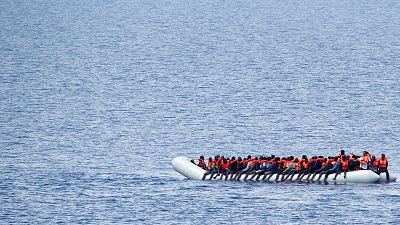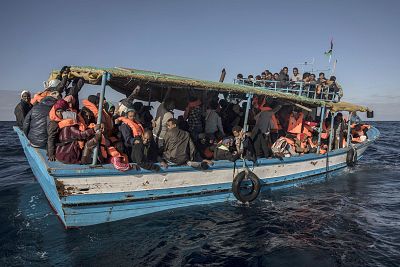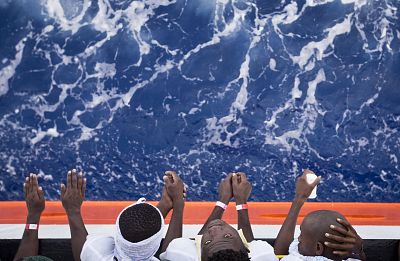Nearly 1,600 people have died or vanished en route to Europe this year, including 1,100 while attempting to cross by sea from North Africa.
LONDON — The death rate among migrants attempting to cross the Mediterranean Sea from Libya to Italy has doubled year-on-year, according to the U.N.'s refugee agency.A report published Monday found that between January and July around one-in-18 people trying to complete that journey either died or went missing. The UNHCR agency said that compares to a figure of one-in-42 people during the same period in 2017.
News
Nearly 1,600 people have died or vanished en route to Europe this year, including 1,100 while attempting to cross by sea from North Africa.UNHCR figures show that the death rate for the entire Mediterranean Sea during the first seven months of 2018 are almost three times the level during the same period in 2015 — the height of Europe's migration crisis. The UNHCR said that represented the "highest death rate on record in the Mediterranean Sea."The spike in the death rate comes despite the fact that fewer people are trying to make the crossing.
Some 72,000 people arrived in Italy, Greece and Spain during the first seven months of 2018, compared to around 121,000 for the same period last year. More than one million arrived in 2015 as a whole.The report also highlighted the reduced number of search-and-rescue operations off the Libyan coast this year.The Libyan coast guard has increasingly taken over rescue operations in the area, with only two nongovernmental groups operating there through July — compared with eight last year.
The coast guard returns migrants to shore, while humanitarian groups take them to Europe as they do not recognize Libya as a safe destination. The report said people were taking greater risks to avoid being detected and returned to Libya.Matthew Saltmarsh, a spokesman for the UNHCR, added, "They're going farther into the Mediterranean in flimsier craft, meaning there's more risk of them capsizing."Jeff Crisp, a refugee expert at the University of Oxford, said the search-and-rescue capacity of humanitarian groups in the Mediterranean had been "drastically reduced" in recent months.He pointed out that the Italian government's decision to block humanitarian groups from disembarking migrants in the country this summer had reduced their capacity to rescue migrants."Rescue ships can find themselves waiting for days at sea to disembark people this is not an effective use of their limited resources," Crisp said. "It drives up the number of people dying en route."In July, Italy closed its ports to the Aquarius rescue ship that was carrying 630 migrants who had been picked up off Libya's coast. Since then Rome has barred several other similar vessels from allowing migrants to set foot on Italian soil.
Since assuming power in March, Italian Interior Minister Matteo Salvini has repeatedly accused humanitarian organizations of being in league with smugglers. Salvini has explained restrictions imposed on their operations by saying Italy refuses to be complicit with traffickers.The country, he said, was saying "no to the business of clandestine immigration."At least 27,000 migrants have died while trying to reach Europe by crossing the Mediterranean Sea since 1993.














